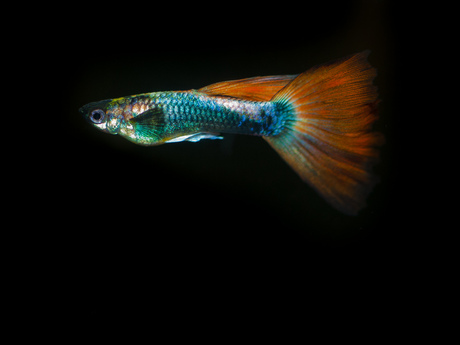So guppies can count

Australian and Italian researchers have discovered that the humble guppy may be smarter than other fish, with strongly lateralised brains that give them the ability to count. Their study has been published in the journal Frontiers in Behavioural Neuroscience.
Scientists have often wondered why humans and other animals have lateralised brains, where the two halves of their brain execute different functions. One theory suggests that having strongly lateralised brains allows each hemisphere to analyse information separately.
“It’s a bit like having a dual processor in a computer,” explained Associate Professor Culum Brown from Macquarie University, a co-author on the study. “Obviously information processing is far more efficient and faster if two processors can independently analyse two different sources of information simultaneously.”
Professor Brown and his colleagues from the University of Padova conducted a study in which guppies were sorted into left, right and non-lateralised groups using a standard mirror test. Their numerical discrimination abilities were then tested in both natural shoal choice and abstract contexts.
“Our experiments show that fish with strongly lateralised brains could differentiate between three versus four objects, both in natural and artificial contexts, whereas those with non-lateralised brains could only differentiate two versus three,” Professor Brown said. Keeping track of objects containing four items seems to be the upper limit of most animals; after this, animals (including humans) switch to an alternative system that relies on ratios when comparing sets.
Professor Brown noted that there are lots of reasons why it might be important for animals to keep track of objects or accurately compare sets. For example, “When faced with a predator, guppies must choose the largest shoal to join because there is safety in numbers,” he said.
The results suggest that animals with strongly lateralised brains would have an advantage in these contexts and may well explain why other animals, like humans, have evolved lateralised brains.
Damaged RNA, not DNA, revealed as main cause of acute sunburn
Sunburn has traditionally been attributed to UV-induced DNA damage, but it turns out that this is...
Multi-ethnic studies identify new genes for depression
Two international studies have revealed hundreds of previously unknown genetic links to...
Oxygen deprivation may contribute to male infertility
Medical conditions that deprive the testes of oxygen, such as sleep apnoea, may be contributing...



